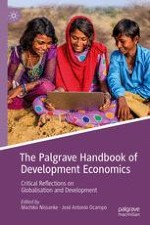2019 | OriginalPaper | Buchkapitel
8. Feminist Economist’s Reflections on Economic Development: Theories and Policy Debates
verfasst von : Maria S. Floro
Erschienen in: The Palgrave Handbook of Development Economics
Verlag: Springer International Publishing
Aktivieren Sie unsere intelligente Suche, um passende Fachinhalte oder Patente zu finden.
Wählen Sie Textabschnitte aus um mit Künstlicher Intelligenz passenden Patente zu finden. powered by
Markieren Sie Textabschnitte, um KI-gestützt weitere passende Inhalte zu finden. powered by
